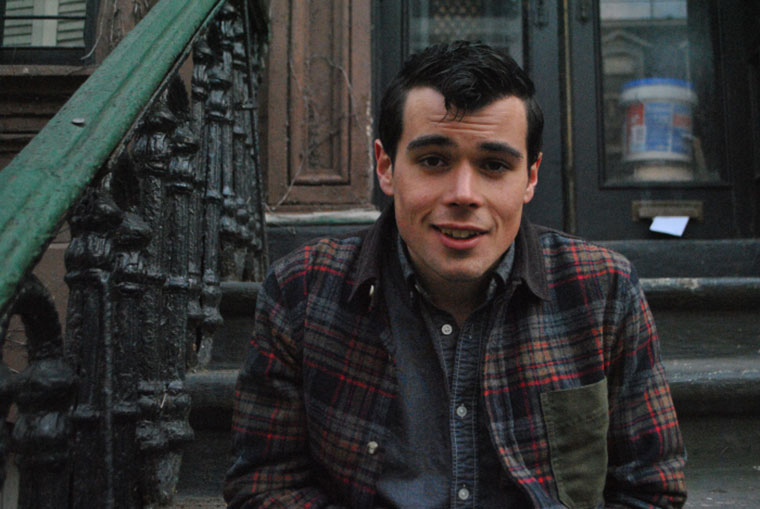 Devin Kelly MFA ’15 founded the Dead Rabbits Reading Series with fellow MFA Writing alumni, and is currently teach high schoolers in New York.
Devin Kelly MFA ’15 founded the Dead Rabbits Reading Series with fellow MFA Writing alumni, and is currently teach high schoolers in New York.
Why did you choose Sarah Lawrence?
Two reasons! First, I had a really wonderful English professor in college, Susan Greenfield, who convinced me to apply for MFA programs even though I hadn’t taken a single creative writing class in college. She offered up Sarah Lawrence as an option, and I trusted her opinion deeply. I got into a few MFA and PhD programs, but the PhD felt like too much of a commitment for me, and it was actually my dad, who isn’t a writer, who helped me make up my mind. He looked at me and said, “Don’t you want to be where the action is?” All the other MFA programs I applied to were located out West, and he was right. I wanted to be at a school that was near New York, one that inspired connections to the city and to people living and working and writing there. And I wanted to be a part of a community. Sarah Lawrence met those requirements and then far exceeded them.
Did you have a favorite class?
David Hollander’s (MFA '97) workshop was the one that granted me the most permission as a writer and truly showed me what a generous workshop model could look like. I felt challenged and excited each day in that room, and I felt like I learned a more capable language for discussing and critiquing work, one that centered more on energy, and positivity, and, as I said, generosity. And, going back to what I initially said, that class really centered my belief that so much of writing is about granting yourself permission, which can feel at times like an impossibly hard thing to do. I’m really grateful to the teachers, including Hollander and so many others, who granted me space to cultivate that.
How do you balance your writing practice with your work as the Director of Enrichment Programming for the Sunnyside Community Services Youth Futures Program at Queens Vocational High School and a teacher at City College?
It’s funny you ask this! I actually just a took a job a few months ago as a full-time high school teacher, so I need to update my bio. But the question still stands. I loved teaching in college and I loved working as an afterschool director in Queens. They both felt like natural extensions of my work as a writer. I was able to teach so many things that continue to inform my writing. I taught Ross Gay’s poems, and James Baldwin’s Giovanni’s Room, and Jo Ann Beard’s essays, and so much else. It was beyond fun. Now, I’m writing this answer outside my high school classroom, which presents a different kind of fun and a different kind of challenge. It’s a little harder these days to write the way I used to, mostly because I have to be dynamic for so much of the day. I don’t really begin to breathe until 4:00 rolls around, and then I have to grade. It feels more involved, and, as such, rewarding, but my writing now is about finding time to make notes that become poems, little lines that might become a story, or an essay.
How did the Dead Rabbits Reading Series come about?
I was sitting on my couch in my apartment on a Wednesday in 2014, I believe, and was watching Gangs of New York (hence the name), and had the thought of creating a reading series that wasn’t located all the way in Brooklyn (sorry, Brooklyn). I immediately texted two classmates, Katie Rainey MFA '14 and Katie Longofono MFA '14, who both agreed. Within an hour we had a name and a website, and the next day, we went to DTUT, a bar and cafe on the Upper East Side, and they’ve been our wonderful venue ever since. It’s been one of the real joys of my life to watch it blossom and maintain a sort of relevance over the years. I honestly can’t believe we’re still doing it. I’ve met so many writers and friends through it, and have felt a part of its makeshift community. I’d be remiss if I didn’t mention that Rainey and her partner-in-crime Brian Birnbaum MFA '16 are spearheading the launch of a related press, Dead Rabbits Books, which is going to be focused on publishing books that matter in ways of language and substance and zeal and emotion. I’m really excited for them (and you should be, too!).
You recently ran the New York City Marathon as an Achilles guide. What was that experience like?
Beautiful. Really beautiful. I’ve been a competitive marathoner since I graduated from college, where I ran competitively as well, and though it’s a wonderful feeling to race as an individual, it was really special to be a guide for someone else. I ran with a blind runner, Don Balcom, who just recently in the past year or two was ranked the #1 blind marathoner in the country. I worked with another guide, and we would alternate running alongside Don while holding a tether that kept us close. I’ve never met someone as gracious as Don. We were laughing almost the whole time, despite the occasional stumbles and falls. It reframed a lot of my thinking about mentality and what a “bad day” can look like, and how so much of getting through a race (or life, to be honest) is about constantly reframing expectations in ways that allow yourself to feel challenged but still encounter joy. I felt really lucky to be given the opportunity to share in that experience with Don.